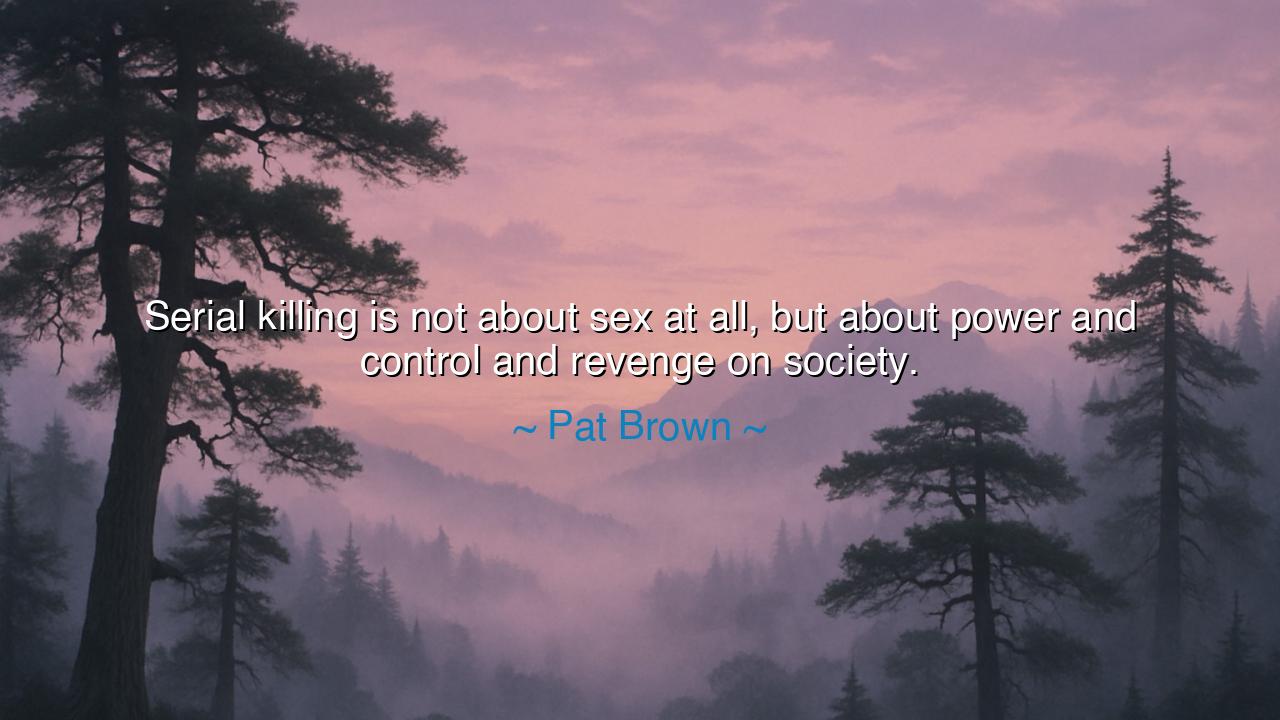
Serial killing is not about sex at all, but about power and
Serial killing is not about sex at all, but about power and control and revenge on society.






The words of Pat Brown—“Serial killing is not about sex at all, but about power and control and revenge on society.”—strip away the illusions and myths that cloud our understanding of one of humanity’s darkest expressions. Too often, the world imagines that such violence is driven merely by desire or perversion. But Brown, a criminal profiler who studied the shadows of the human psyche, reveals that the heart of serial killing lies not in lust but in domination, vengeance, and rage. It is the cry of a fractured soul that seeks to assert itself against a world it perceives as cruel and unjust.
The ancients would have called this a perversion of the will to power. For every human soul longs to be seen, to be heard, to have influence over the world around it. When love and recognition are denied, some souls turn inward, hardening into bitterness. In their fury, they strike outward at society, not with words or argument, but with the ultimate assertion: the taking of life. Thus, Brown speaks a grim truth: serial killing is the war of one against all, the vengeance of the excluded upon the world that they believe has scorned them.
History gives us many terrible examples. Consider the case of Ted Bundy, often romanticized by those who mistake charm for depth. Yet behind his crimes there was no true romance, no real lust. There was instead a burning desire to dominate, to control, to prove himself superior. He sought not the intimacy of another, but their helplessness beneath his hand. Likewise, Andrei Chikatilo of Russia, the “Butcher of Rostov,” was driven less by passion than by rage against a society in which he felt powerless. In both cases, the killings were not acts of love distorted, but acts of power claimed through destruction.
Pat Brown’s insight forces us to see that such crimes are mirrors held up to society. For the killer’s “revenge” is born of a sense of alienation. They feel cast out, humiliated, powerless. Rather than seek healing, they embrace violence as the only language they believe the world cannot ignore. Their murders are not simply against individuals; they are symbolic strikes against society itself. Each victim is chosen not for who they are, but for what they represent—a vessel upon which the killer enacts his fury against life.
This teaching is heavy with warning. For when societies neglect the alienated, when they dismiss the broken, when they fail to see those spiraling into rage and despair, they allow these dark seeds to grow unchecked. No one is excused for such atrocities, yet it is clear that isolation breeds monsters. A person who feels unseen, unheard, and unwanted may seek power in the only way they believe possible: by forcing others to suffer as they have suffered. In this way, the killer transforms their weakness into a twisted semblance of strength.
The lesson for us is profound: the antidote to vengeance is belonging, and the counter to domination is dignity. If we wish to reduce the birth of such horrors, we must build societies that see the vulnerable, that reach out to the isolated, that do not let rage ferment in silence. Justice must be strong, yes, but so too must compassion. We cannot excuse evil, but we can weaken its roots by refusing to create a world of permanent outsiders.
Practically, this means tending to our communities with vigilance and care. Notice those who withdraw, who seem perpetually humiliated or enraged, who cry out for power in destructive ways. Support systems of mental health, create channels for purpose, and teach that dignity can be won not through domination, but through contribution. Each of us has the power to affirm others before bitterness becomes wrath. By doing so, we prevent some from taking that dark path where revenge on society manifests in cruelty and blood.
Thus, Pat Brown’s words remain an unflinching truth: serial killing is about power, control, and revenge on society. Let us not misunderstand it as passion gone astray, but as alienation hardened into destruction. And let us learn: the surest way to defend society is not only by punishing those who cross that line, but by building a world where fewer souls feel so powerless that they long to cross it at all. In this way, we honor life not only by condemning death, but by nurturing dignity before it is lost.






AAdministratorAdministrator
Welcome, honored guests. Please leave a comment, we will respond soon